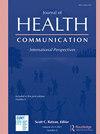M Kebbe, A Eaton, Mp Dyson, Sd Scott, Tlf McHUGH, M Yaskina, T Ladha, B Islam, K Talwar, Jl Wincott, Gdc Ball
求助PDF
{"title":"测试 \"青少年对话卡©\"的可行性、用户体验和初步效果,以促进初级保健中的行为改变和合作目标设定:随机对照试验。","authors":"M Kebbe, A Eaton, Mp Dyson, Sd Scott, Tlf McHUGH, M Yaskina, T Ladha, B Islam, K Talwar, Jl Wincott, Gdc Ball","doi":"10.1080/10810730.2024.2411318","DOIUrl":null,"url":null,"abstract":"<p><p>Our team developed <i>Conversation Cards for Adolescents©</i> (CCAs), a tool to help adolescents and health care providers (HCPs) communicate and collaboratively set behavior change goals. The objectives of this pilot randomized controlled trial were to test the feasibility, user experience, and preliminary effect of using CCAs with adolescents in primary care, focusing on behavior change and collaborative goal setting among adolescents. From March 2019 to September 2022, adolescents were recruited from the Northeast Community Health Centre (Edmonton, AB). Adolescents were randomized (1:1) to one of two groups: CCA + goal setting (experimental group) or goal setting alone (control group). Data were collected from both groups at baseline and at 3-weeks post-baseline. In total, 31 adolescents completed the trial (terminated early due to COVID-19). The study demonstrated high practicality. Adolescents reported positive user experiences with CCAs, citing attractiveness, clarity, efficiency, and dependability. No group differences were detected for behavior changes at 3-weeks post-baseline (<i>p</i> > .05), although adolescents in the experimental group qualitatively described improved rapport and communication with HCPs. CCAs can be used practically in a primary health care setting to facilitate communication and rapport with adolescents; however, their effect in enabling behavior change should be investigated in a multi-site, larger-scale trial.</p>","PeriodicalId":16026,"journal":{"name":"Journal of Health Communication","volume":" ","pages":"663-671"},"PeriodicalIF":2.4000,"publicationDate":"2024-10-02","publicationTypes":"Journal Article","fieldsOfStudy":null,"isOpenAccess":false,"openAccessPdf":"","citationCount":"0","resultStr":"{\"title\":\"Testing the Feasibility, User Experiences, and Preliminary Effect of <i>Conversation Cards for Adolescents</i><sup>©</sup> For Behavior Change and Collaborative Goal Setting in Primary Care: A Pilot Randomized Controlled Trial.\",\"authors\":\"M Kebbe, A Eaton, Mp Dyson, Sd Scott, Tlf McHUGH, M Yaskina, T Ladha, B Islam, K Talwar, Jl Wincott, Gdc Ball\",\"doi\":\"10.1080/10810730.2024.2411318\",\"DOIUrl\":null,\"url\":null,\"abstract\":\"<p><p>Our team developed <i>Conversation Cards for Adolescents©</i> (CCAs), a tool to help adolescents and health care providers (HCPs) communicate and collaboratively set behavior change goals. The objectives of this pilot randomized controlled trial were to test the feasibility, user experience, and preliminary effect of using CCAs with adolescents in primary care, focusing on behavior change and collaborative goal setting among adolescents. From March 2019 to September 2022, adolescents were recruited from the Northeast Community Health Centre (Edmonton, AB). Adolescents were randomized (1:1) to one of two groups: CCA + goal setting (experimental group) or goal setting alone (control group). Data were collected from both groups at baseline and at 3-weeks post-baseline. In total, 31 adolescents completed the trial (terminated early due to COVID-19). The study demonstrated high practicality. Adolescents reported positive user experiences with CCAs, citing attractiveness, clarity, efficiency, and dependability. No group differences were detected for behavior changes at 3-weeks post-baseline (<i>p</i> > .05), although adolescents in the experimental group qualitatively described improved rapport and communication with HCPs. CCAs can be used practically in a primary health care setting to facilitate communication and rapport with adolescents; however, their effect in enabling behavior change should be investigated in a multi-site, larger-scale trial.</p>\",\"PeriodicalId\":16026,\"journal\":{\"name\":\"Journal of Health Communication\",\"volume\":\" \",\"pages\":\"663-671\"},\"PeriodicalIF\":2.4000,\"publicationDate\":\"2024-10-02\",\"publicationTypes\":\"Journal Article\",\"fieldsOfStudy\":null,\"isOpenAccess\":false,\"openAccessPdf\":\"\",\"citationCount\":\"0\",\"resultStr\":null,\"platform\":\"Semanticscholar\",\"paperid\":null,\"PeriodicalName\":\"Journal of Health Communication\",\"FirstCategoryId\":\"3\",\"ListUrlMain\":\"https://doi.org/10.1080/10810730.2024.2411318\",\"RegionNum\":2,\"RegionCategory\":\"医学\",\"ArticlePicture\":[],\"TitleCN\":null,\"AbstractTextCN\":null,\"PMCID\":null,\"EPubDate\":\"2024/10/7 0:00:00\",\"PubModel\":\"Epub\",\"JCR\":\"Q1\",\"JCRName\":\"COMMUNICATION\",\"Score\":null,\"Total\":0}","platform":"Semanticscholar","paperid":null,"PeriodicalName":"Journal of Health Communication","FirstCategoryId":"3","ListUrlMain":"https://doi.org/10.1080/10810730.2024.2411318","RegionNum":2,"RegionCategory":"医学","ArticlePicture":[],"TitleCN":null,"AbstractTextCN":null,"PMCID":null,"EPubDate":"2024/10/7 0:00:00","PubModel":"Epub","JCR":"Q1","JCRName":"COMMUNICATION","Score":null,"Total":0}
引用次数: 0
引用
批量引用

 求助内容:
求助内容: 应助结果提醒方式:
应助结果提醒方式:


